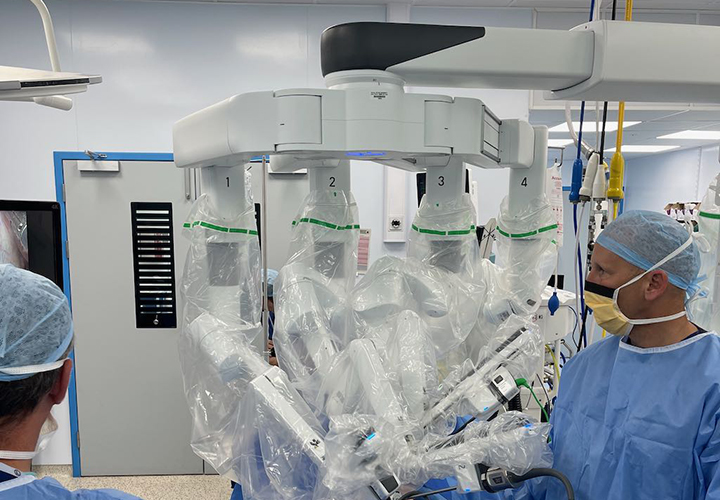Major expansion of robotic surgery at the Royal Devon
18 Jul 2023
Surgeons at Royal Devon University Healthcare NHS Foundation Trust are excited to be expanding the use of robotic surgery in patient care.
The Trust has two new robots thanks to national funding from NHS England and the Cancer Alliance – one at North Devon District Hospital (NDDH) and one at the Royal Devon and Exeter (Wonford) hospital.
This is the first robot at NDDH, where patients are now benefiting from robotic surgery for hiatal hernias, inguinal hernias and gallbladder removal.
Professor David Sanders, Consultant and Clinical Lead for GI, said: “We’re really pleased to have the new Da Vinci robot at NDDH and are excited about the benefits it will bring. The robot offers exceptional precision and the most advanced surgical technology for our patients.”
It’s the third robot at the RD&E (Wonford) hospital, and is being used by a team of ear, nose and throat (ENT) surgeons to remove tumours of the tonsils, tongue, voice box and swallowing passage, so far.
The first robot existing at RD&E (Wonford) has been in place for 10 years and has been used for urology operations, performing more than 2,000 cancer procedures. A second type of robot has been in place for approximately four years in support of major orthopaedic surgery.
When using the robots, surgeons operate the instruments from an operating console and the instruments move like the surgeon’s hands. This allows complex procedures to be performed with increased accuracy and precision, which means surgery can be keyhole rather than open. Robotic surgery patients recover faster and have a shorter stay in hospital.

Joel Smith, Lead ENT Surgeon, said: “We’re thrilled to have the Da Vinci robots in place for our trans-oral procedures as the advantages for our patients are significant. Operations are faster and less invasive – what used to take up to 12 hours and involve open surgery can now be performed as keyhole surgery and take 60 minutes.
“Patients who would have previously needed intensive care nursing patients go straight back to the ward. The average length of stay is four days and some patients can go home the day after surgery."
The new robot in ENT means the Royal Devon is the first Trust in the South West to be able to perform trans-oral robotic surgery, with patients previously having to travel to Oxford or London if they needed this care.
In addition to its existing use in ENT and urology, the new robot at RD&E (Wonford) will mean that the Royal Devon can expand the use of robotic surgery for colorectal surgery across its sites in the coming months. Growth in the number of urology procedures that can be done is also planned, as well as for certain types of gynaecology procedures in the late Autumn.

Mr Kenneth Keogh, Consultant Colorectal Surgeon, said: "I am delighted that we have been able to begin robotic assisted colorectal surgery at the RD&E with a DaVinci system. This will ensure that we can provide the highest level of care with the most up-to-date systems for the patients of Devon requiring colorectal surgery or abdominal wall surgery.
“Our colleagues in urology have already been undertaking robotic surgery for some time and as our colleagues in gynae-oncology also start operating, this will allow us to perform procedures together, using the robot, avoiding a large open abdominal incision."
The robots will also play an important role in offering opportunities for colleague development.
Joel added: “This technology allows us to be innovative in the way we approach surgery, and this makes the Royal Devon an attractive proposition for junior doctors and theatre staff, to come and train in the latest surgical techniques.”

